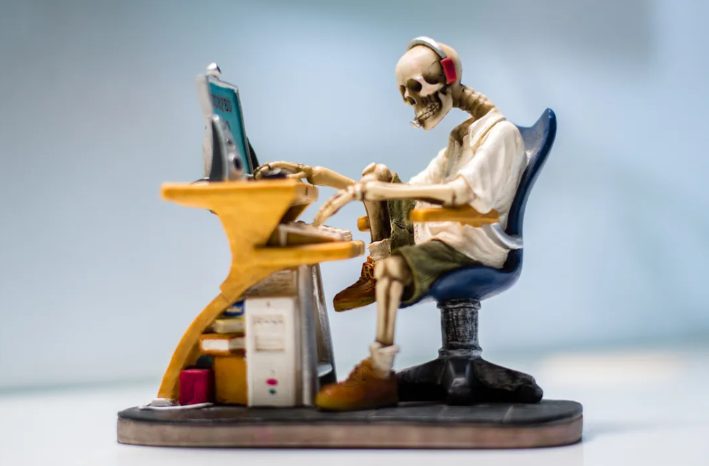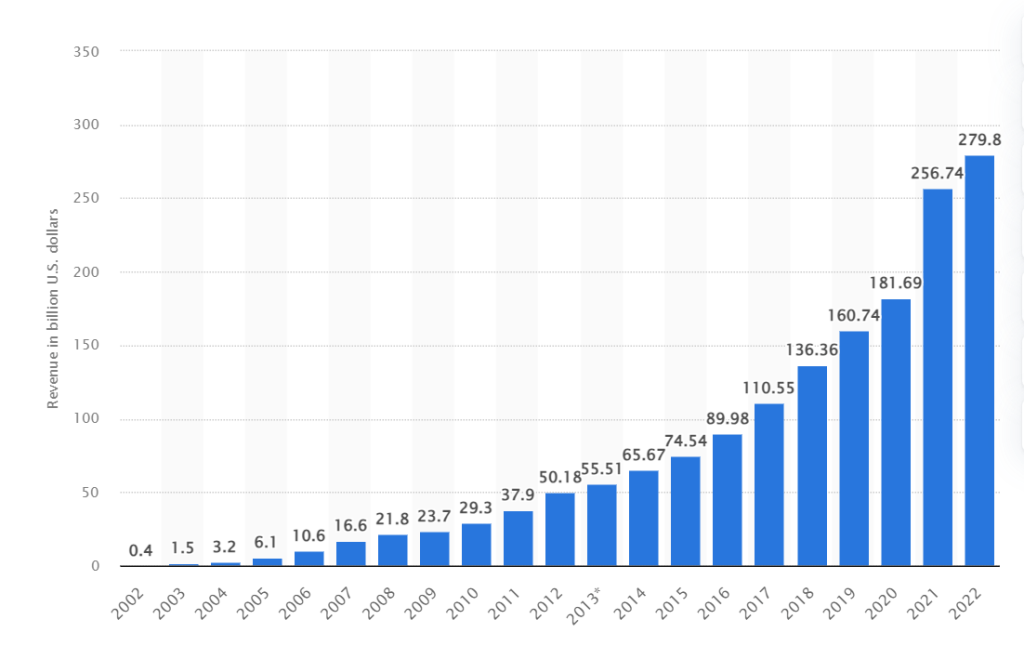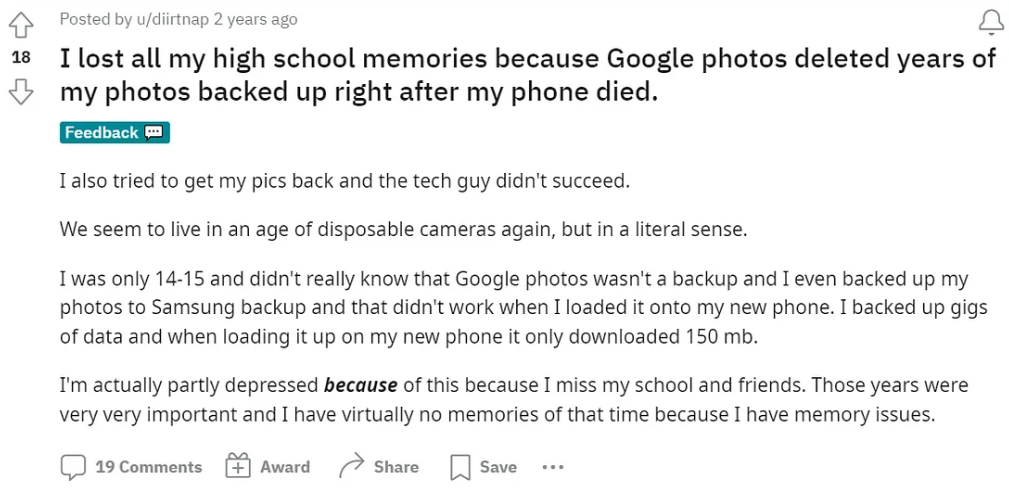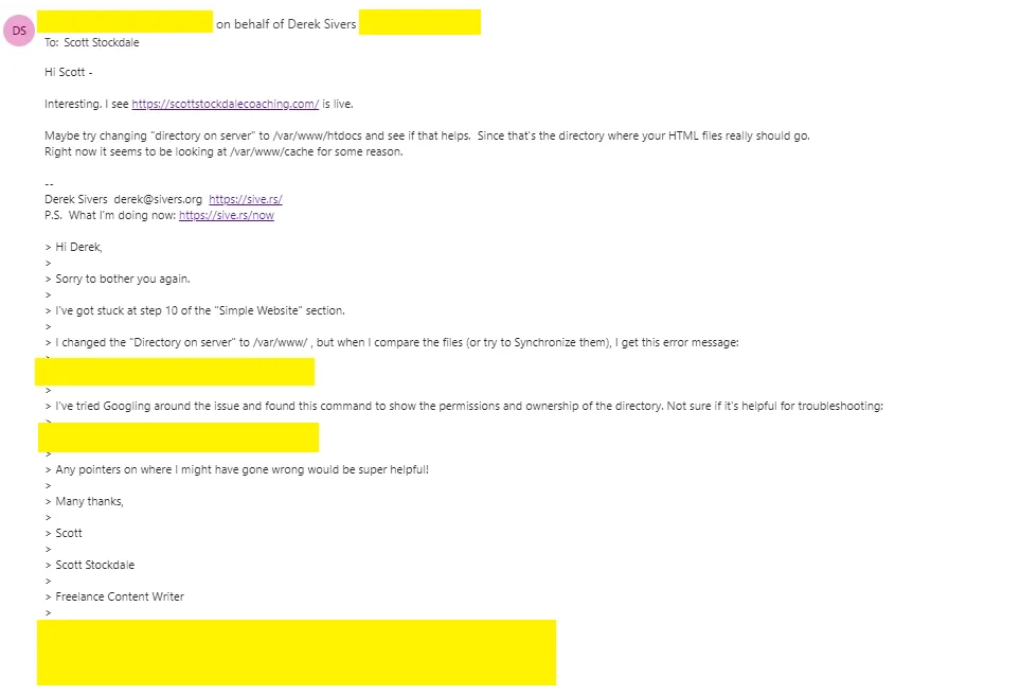
Derek Sivers’s Tech Independence could save you if Google died tomorrow
It’s no secret that Google has faced its biggest existential threat in the last 12 months.
ChatGPT.
For years, Google watched its growth go unchecked. Billions upon billions of dollars have been raked in over the last two decades:

But now Google is scared.
That’s why it was in such a hurry to fling Bard onto the market — “an AI experiment by Google.”
It’s throwing everything it’s got against Open AI.
Now I’m not here to say that ChatGPT will kill off Google. Far from it. I’d back Google in a scrap. Nor will it actually die tomorrow.
But what if Google did die?
Are you prepared? Or do you have a million photos and files floating around on your Google Drive? And do you have an alternative email address? What about your contacts?
It’s not just Google, by the way.
There’s a graveyard of companies out there. Napster, Blockbuster, Myspace… We mistakenly think some companies are too big to fail until one day—SURPRISE!
There could be a time when Amazon is just a rainforest again.
“In 2020, the average lifespan of a company on Standard and Poor’s 500 Index was just over 21 years, compared with 32 years in 1965 […]” — Statista.com
Even if Google doesn’t die, you’ve got to be careful.
There are countless stories of people who’ve lost their photos by not setting things up correctly:

Similarly, Dan Moren tells the story of being “bitten by the black box of iCloud”:
“You just put your faith in the fact that what’s working will keep working. But as anybody who’s ever tried to troubleshoot iCloud problems can tell you, when it goes wrong, trying to fix it is an exercise in frustration […]”
Then, of course, there are issues around security.
Uploading thousands of files and never managing them creates privacy risks. Plus, photo collections unknowingly include lots of sensitive personal information—about you and others.
Alright, that’s enough doom-mongering.
How can you protect yourself?
Let me introduce you to Derek Sivers
In 1998, Derek founded CD Baby as a favor for a friend. It accidentally became the largest online seller of independent music, with more than $100 million in sales. He sold it in 2008 and has since traveled the world, engaging in creative projects.
Earlier this year, Derek spoke on The Tim Ferriss Show about something called Tech Independence:
“So Tech Independence is all about the fact that the main sales pitch of the cloud is, ‘Now, don’t worry your little head about that. Let us take care of it. We’ll keep all of your data. See? Isn’t that easier now? There. We’ve got your data.’
“I wish that history had gone such a way that we all had our own little private server at home, but instead, the cloud made a better sales pitch saying, ‘No, no, no, give us all your stuff. We’ll take care of it forever.’
“So my idea is if you spend a few hours learning how to do it yourself, you’ll have Tech Independence. What that means is self-reliance. It gives you better security, better privacy, better freedom, better flexibility and total control.
“And it’s a great use of your time to spend a few hours learning to do this, kind of like somebody learning to drive a manual transmission, right? You don’t need to do it. But this is a good life skill to have[…]”
This isn’t just about protecting yourself.
It’s about being informed.
“When’s the last time anyone listening to this—or even I’ll speak for myself—yours truly—read the complete terms and service? When something pops up, and it’s 27 pages, and you’re like, ‘Yeah, yeah, yeah. Okay, click accept.’ There’s a lot of stuff buried in there. Yeah, there’s a reason there are armies of lawyers that work on terms of service and that they’re updated constantly.”
That’s the context.
Before we continue, here’s something Tim addresses in case you’re thinking the same:
“I do not experience you [Derek Sivers] to be a hyper-paranoid person at all. So I just want to mention that because folks might think, ‘Oh, my God, this guy’s got like 20 years’ worth of oatmeal and gold bars and guns in the basement.’”
So how do you actually set this up?
Derek Sivers’s Tech Independence in the wild
“Learn a few of these basic tools, and you can run your own private server on any computer forever, for the rest of your life. Host your own website and email. Keep your own contacts and calendars synced with your phone. Backup and sync your photos, movies, and music to your own private storage. No more subscriptions needed.” — Derek Sivers
In this blog post, Derek has kindly laid out detailed step-by-step instructions for learning these tools.
I highly recommend checking it out.
FAQs about Tech Independence
Q: Is it hard to set up?
Not really.
Derek’s instructions are super clear, so even if you’ve got no experience with this sort of thing (like me), you’re good to go.
And if you do get stuck, Derek’s happy to answer questions via email:

Q: “I have more confidence in Google being around in five years than I do in these companies, which I know nothing about. Ultimately, you can have a certain degree of liberation, but if your infrastructure fails or these people put up a ‘Closed for Business’ sign, it’s game over […] How you would address people with those types of concerns?” — Tim Ferriss
This is a great question.
I’ll let Derek take it:
“Everything I’ve recommended here was recommended with that in mind. You should expect that you will outlive most businesses.
“Everything is done with your own domain name. So if [a company Derek recommends] disappeared one day, you’d just log into your domain name router and route it to another service […]
“Same thing with the servers I’m talking about. If one of these services in Germany or New Jersey suddenly went under, no big deal. You’ve got your remote clone […]
“So all of this is expecting everybody to fail.
“You don’t need iCloud, you don’t need Dropbox, you don’t need Google Drive. You’ve got your own server.”
Q: WordPress is open source. Why not use it?
“You could, but WordPress is like […] 38 billion lines of code. And it does way more than what you need.
“So it’s kind of like if you said, ‘I need some scissors,’ and somebody handed you the contents of an entire hardware store. You’re like, ‘No, I really just need to cut this.’
“I love WordPress, and I used it for years […] but I think it intimidates people to the point of paralysis […]
“By the way, I’m just saying WordPress, I mean, it could be Ghost, it could be any of these things. You get the impression that making a website is hard, but it’s not.”
Takeaways
I’ve legit felt like an MI5 agent over the last few months as I’ve accessed parts of my computer’s hard drive that I didn’t know existed.
With Derek’s instructions, you can do the same.
So if you’re looking for a new project, or you just want to protect yourself against the “black box of the cloud”, Derek Sivers’s Tech Independence could be for you!



